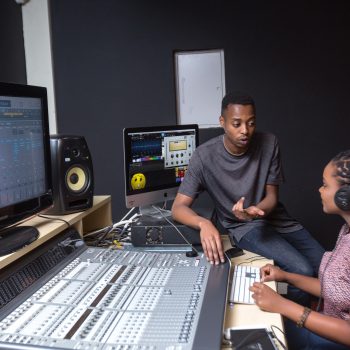
Top 5 Music Production Software
Music production does not require expensive software. Here are some free tools to get you started.
The Certificate in Music Production and Sound Engineering focuses on learning by doing (practical and experiential learning). The course provides learners with training in Music Production Analysis, Mixing Fundamentals, Introduction to DAW, Basic Music Production, and Ear Training.
Course code: MPE100
Award: Level 5 National Certificate
The Certificate in Music Production and Sound Engineering focuses on learning by doing (practical and experiential learning). The course will run over a period of fourteen weeks and provide learners with training in Music Production Analysis, Mixing Fundamentals, Introduction to DAW, Basic Music Production and Ear Training. The course will equip learners with basic technical skills and requisite experience they need to pursue and build successful and exciting careers within this field. Through career launchpad class, learners will acquire essential soft skills that equip them to interact better with other students and the outside world.
Credits: 1200 Hours or 120 Credits
Intakes: January, May, September
Upon successful completion of this course you should be able to:
As a sound engineer in a recording studio, you would make high quality recording of music, speech and sound effects. If you enjoy working with electronics and are interested in music and sound, this could be the ideal job for you. In this job, you would need to have a good sense of hearing. You would also need to understand musical pitch, timing, and rhythm. With experience, you might also act as Studio Manager. You may also be known as an audio engineer or recording engineer.
Other jobs that you could take up with the qualification may include:
ADMI prides itself in having modern, state of the art equipment that meet global standards. As a sound engineering student you will have the opportunity to use the following equipment:
ADMI has also invested in industry standard software including:

Kennedy Wathome is a Kenyan Urban Pop Music Producer, a Mix Engineer, Music Director, and an Educator. He has received widespread acclaim for his works across the Kenyan music scene with an experience of more than 10 years in music production and sound industry, his works cut across from commercial and non-commercial to corporate and education sectors.
He runs his own company Pop Nation Entertainment with a passion for helping and creating opportunities for upcoming artists in the industry, revolutionizing the country’s music scene and entertainment as a whole.
He is currently a core faculty at the African Digital Media Institute in the music and sound department where he extends his passion for sharing skills gained from the industry to young upcoming music producers and sound engineers.
He attained a certificate in music, a diploma in music, and a degree in music technology and currently pursuing a postgraduate degree in master of musical arts (Music Composition)
High School Education:
KCSE D (Plain), KCE Div. III or equivalent qualification or certificate of experiential Learning or completion of KNQF Level 4.
Basic computer proficiency is required.
To apply online please visit: https://apply.admi.ac.ke/
Mode of study: Part time – 1 semester
Intakes: January, May, September
Campus: Caxton House, CBD Nairobi
We understand that choosing the right educational path is a crucial decision and we are here to guide you every step of the way. Simply submit your contact details in the form and our team will reach out to provide personalized assistance. Let’s take the first step towards realizing your aspirations!

Music production does not require expensive software. Here are some free tools to get you started.

Meet Vallerie Muthoni, a young, bubbly Kenyan who has invested her time and money into building her career as a musician.

Here is a compilation of tips on how to succeed in the music production business.